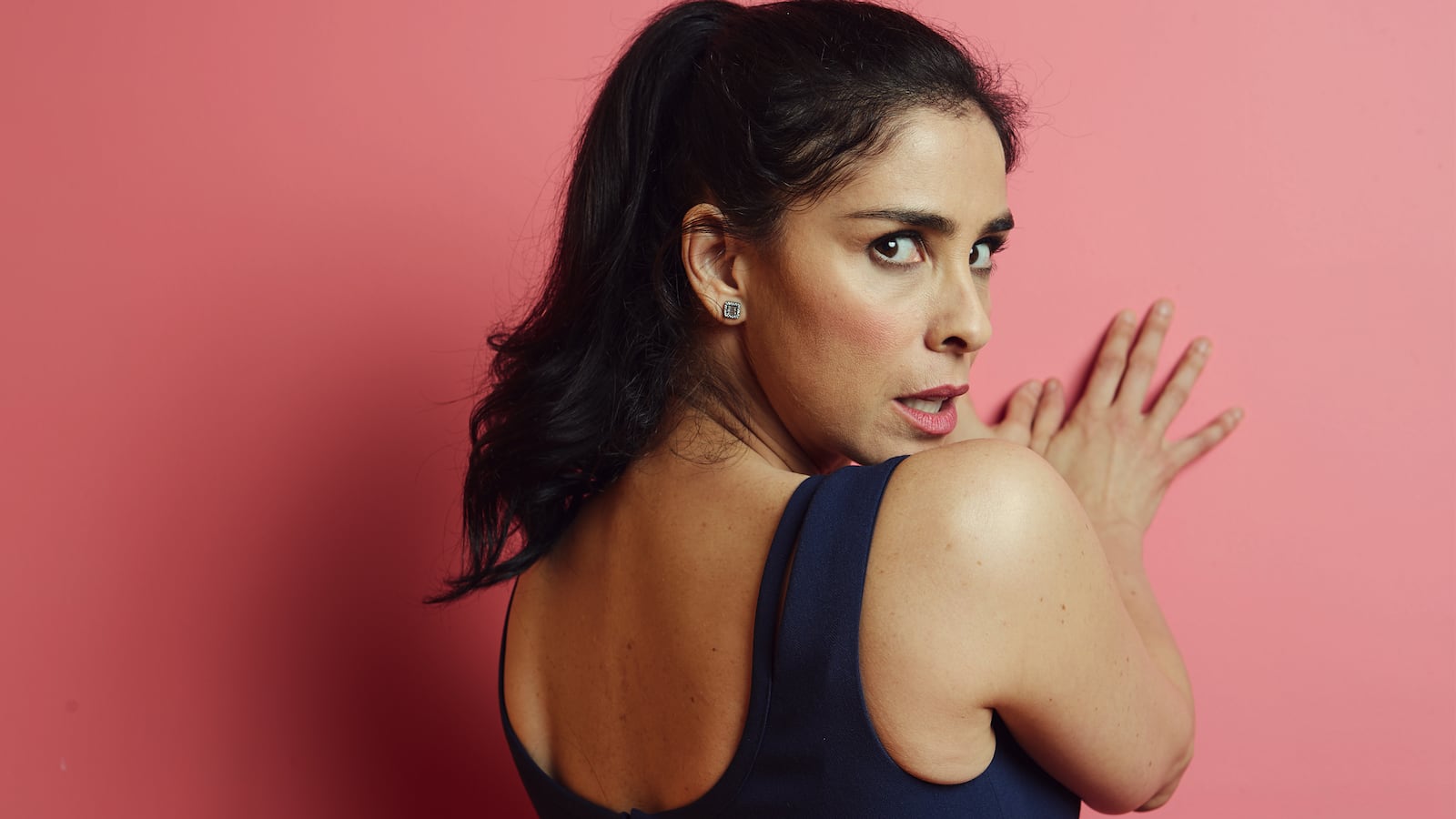In this age of late-night TV hosts rushing to rewrite their monologue jokes to keep up with every new Trump administration outrage, Sarah Silverman is taking a very different approach.
The Daily Beast got a sneak peek of Silverman’s new Hulu show I Love You, America at a taping this week for the premiere episode that will start streaming Thursday night. The new half-hour weekly series, produced by Funny or Die, is almost aggressively not topical, even though a press release used that word to describe it when it was announced earlier this year.
In fact, Silverman does not even like to call it a “talk show,” as she revealed in a recent interview with The New York Times’ Jason Zinoman. At least in its first episode, Silverman performs an opening monologue, shows a taped field piece and then sits down on stage with a guest. But beyond that, the show feels very different from your typical late-night show. And not just because Silverman is one of a small but growing cadre of female hosts.
It’s a distinction that Silverman addresses directly in the premiere. Following a bizarre take on picturing the audience naked to ease her nerves that includes a deliberately jarring amount of full-frontal nudity of both sexes, Silverman explains that since some moments on the show might make people “feel uncomfortable,” she has come up with a novel solution.
“What we’re going to do is have a white man at a desk,” she tells viewers. “Just your average, run-of-the-mill late-night talk show host to go to whenever things get a little uncomfortable.” With that, the camera pans over to Silverman’s Masters of Sex co-star Mather Zickel, who looks a lot like the various Jimmys audiences are used to seeing before they go to bed every night. It’s Silverman’s way of saying, this is not what you are going to get on my show.
Silverman’s show might evolve over time, but in her debut monologue, there was no mention of Donald Trump, Harvey Weinstein or any other big name in the news. The most overtly political part of the show came in the form of an opening musical number that found the comedian crooning about her “white privilege” and “liberal bubble.” Sample line: “I love you, America, from the Great Lakes to the Great Plains to America’s pussy, the Grand Canyon.”
I Love You, America really comes alive when Silverman leaves the studio. After admitting that as a progressive Californian she may have some “unfair preconceived notions about what people are like in the rest of America,” she adds, with a smile, “but that’s the cunty part of me I’m trying to change with this show!”
What follows is a taped piece chronicling her time spent with a Trump-voting family in rural Louisiana. In many ways, these people could not be more different from Silverman. They hated Obama, whom they still think might have been an “immigrant,” yet at the same time benefit from many of the policies he championed. They seem like they might be open-minded on LGBT issues, but marriage equality is still a bridge too far. Most of them have never met a Jewish person before.
But instead of mocking them or even forcefully challenging their beliefs, Silverman spends most of her time patiently listening and trying hard to understand where they’re coming from. She displays a genuine sense of empathy not always apparent in political comedy these days.

“There are a lot of brilliant shows out there that are my favorite shows, but they connect with likeminded people,” Silverman told The Daily Beast’s Kevin Fallon in an interview this past May. “My hope is to connect with un-likeminded people and expose to them, and to us, that we’re the same.”
This mission no doubt stems from her own experience of the 2016 election. A major Bernie Sanders supporter, Silverman had no problem switching her allegiance to Hillary Clinton when the time came. She even spoke on behalf of the nominee at the Democratic National Convention, shouting down the boos from “Bernie of bust” people by telling them, “You’re being ridiculous.”
In that same New York Times story, Silverman’s sister describes how distraught she was after Donald Trump won. “She was sobbing, beside herself, like her guts were coming out,” Susan Silverman said, “but in that conversation, she said we have to start listening to each other and can’t go on like this in our own echo chambers.”
The interview segment that ends Silverman’s premiere includes yet another attempt to reach outside of her own bubble. Cozied up on a couch with former Westboro Baptist Church member Megan Phelps-Roper, Silverman again does more listening than talking as she tries to understand what fuels extremist hate.
Towards the end of the long interview, Phelps-Roper lays out the four steps she has found effective in trying to connect with people on the opposite side of a political or ideological divide. They could also serve as a mission statement for Silverman’s show. The steps boil down to: See them as human beings, ask questions, stay calm, and only then, make your argument.
Most late-night hosts on TV today start with the last part of that equation and skip right over the first three steps. As viewers, we already have the righteous indignation of Samantha Bee, the incredulous frustration of John Oliver and, most recently, the emotional determination of Jimmy Kimmel.
In her first episode, Silverman shows a deep willingness to take a different tack. Now, she just has to hope that Trump voters have Hulu.






